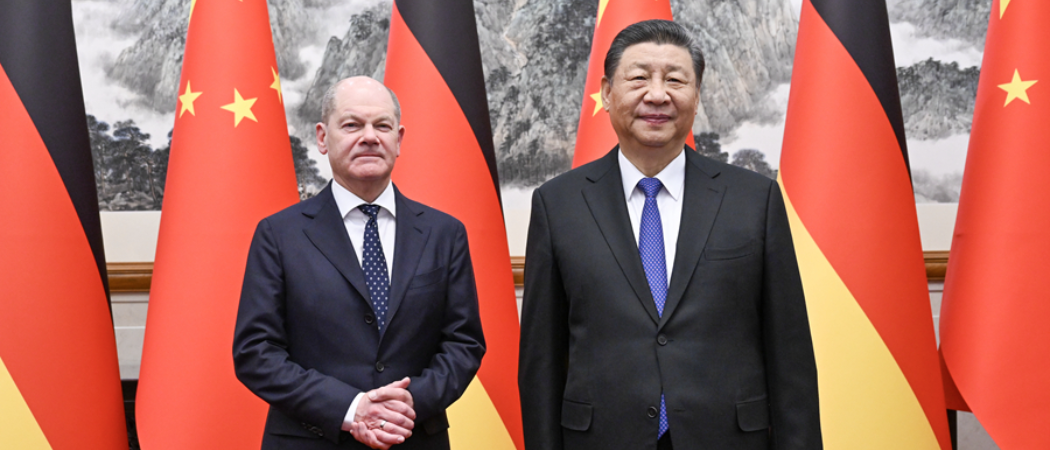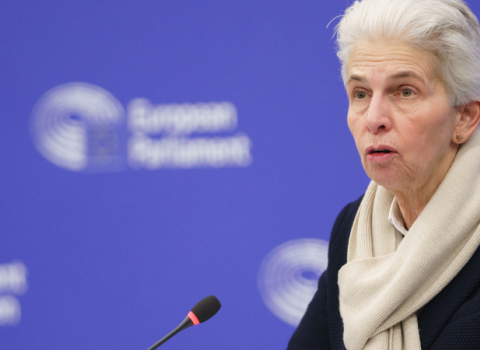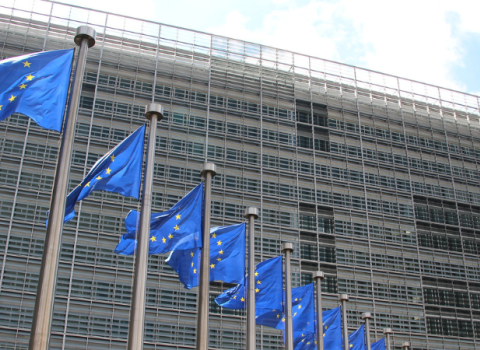Details of ship propulsion systems and the illegal export of lasers: three spies allegedly passed on information about cutting-edge technology to China in exchange for money

On the morning of April 16, German Chancellor Olaf Scholz (left) met with President Xi Jinping at the Diaoyutai State Guesthouse in Beijing. Photo credits: Embassy of the People's Republic of China in the Kingdom of Cambodia
China's state security recruited three individuals in Germany to gain access to technical secrets, according to the country’s Federal Office for the Protection of the Constitution (BfV).
The German police have arrested the three suspects, whom the Federal Public Prosecutor's Office accuses in arrest warrants of spying on "innovative technologies with military applications." Specifically, they are accused of stealing research on the current state of ship propulsion systems and laser technology.
"The three arrests for suspected espionage for a Chinese intelligence service are a huge success for our counter-espionage efforts," said the federal minister of the interior Nancy Faeser on Monday.
Faeser thanked the BfV, and the Federal Criminal Police Office for their "high level of vigilance." Meanwhile, the Chinese embassy in Berlin rejected the accusation. "We call on Germany to desist from exploiting the espionage accusation to politically manipulate the image of China and defame China,” it said.
The revelation comes at a tense time in Sino-German economic and research relations. Just last weekend, it emerged that a Chinese cyber group had been spying on Volkswagen's knowledge for years. There is also intense debate about the risks of academic cooperation with China.
Politically, positions could hardly be further apart: while chancellor Olaf Scholz campaigned for more cooperation in Beijing last week, federal research minister Bettina Stark-Watzinger seems to suspect the Communist Party is behind every Chinese researcher. In the current case, the suspects did, in fact, orchestrate a research collaboration on behalf of China.
The contact person of the three alleged spies was based in China and worked for the Chinese Ministry of State Security (MSS). The federal prosecutor named Thomas R. as the lead agent in Germany. In turn, Thomas R. commissioned a company in Duesseldorf, which then commissioned a university to carry out a study. The study concerned the technical level of Germany's naval engines, which are also used in warships. Such information is restricted under the Foreign Trade and Payments Act.
Laser exports
The export of technology that can also be used in weapons - dual use - is also regulated. The suspected spy trio was also active in this area. They acquired a special laser and shipped it to China, bypassing export controls.
The alleged agent, Thomas R., is well-known in China circles. He was involved in initiating business, particularly between Hong Kong and Germany. Together with the other suspects, Ina F. and Herwig F., he ran several companies and associations in the field of Sino-German cooperation. Herwig F. presents himself as an engineer and inventor with numerous patents.
There are now two possibilities and a number of grey areas, which will certainly be discussed in court: either the suspects were aware of conducting illegal activities for a foreign intelligence service – or they rather naively believed themselves to be in a grey area and misjudged the identity of their Chinese contacts.
A successful investigation by the BfV led to the arrests, said its president Thomas Haldenwang in Berlin on Monday. He said that the individuals involved had been tracked down early on. This was followed by a longer phase of surveillance before the BfV handed the case over to the public prosecutor's office.
Haldewang indicated that the three suspects were not the only spies active in Germany. It is "part of a comprehensive business" that often involves the use of front companies and middlemen.
'China is a bigger threat than Russia'
In a speech almost exactly a year ago, Haldewang urgently warned of Chinese espionage. "Russia is the storm – China is climate change," he said at a symposium in Berlin.
The annual report of the German domestic intelligence agency even refers to China as the "greatest threat in terms of economic and scientific espionage as well as foreign direct investment in Germany." It states that the People's Republic is one of the four main players in espionage against Germany – alongside Russia, Iran and Turkey.
This means that China is particularly well organised and systematically gathers information from other countries. "In Germany, the Chinese agencies focus on politics and administration, business, science and technology as well as the military," said Haldewang.
In order to achieve its ambitious industrial policy, China uses espionage in business and science, buys German high-tech companies either entirely or partially, and systematically recruits knowledge carriers, he said.
Espionage – in casual conversation
However, it is not easy to identify the beginnings of espionage when initial contacts are made. In many cases, it through so-called open information gathering. Information is first gathered through seemingly harmless socialising. This is particularly aimed at active and former decision-makers in politics and business. However, Chinese agencies have increasingly begun to focus on the scientific community.
The goals include obtaining products and knowledge for the manufacture of weapons of mass destruction, their delivery systems, other armaments or elements of new weapon systems. They also seek to acquire other defence equipment and militarily applicable high-tech.
In response to Monday's arrests, the German government now intends to intensify the search for spies. "We are aware of the considerable danger posed by Chinese espionage to business, industry and science," said Faeser. "We are looking very closely at these risks and threats and have issued clear warnings and raised awareness so that protective measures are increased everywhere.”
This text appeared for the first time in Research.Table, a professional briefing from the largest independent start-up for quality journalism in Germany. The editorial team reports for the key people in the research scene who set and fill the framework for science, research and development.





 A unique international forum for public research organisations and companies to connect their external engagement with strategic interests around their R&D system.
A unique international forum for public research organisations and companies to connect their external engagement with strategic interests around their R&D system.